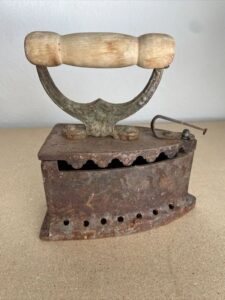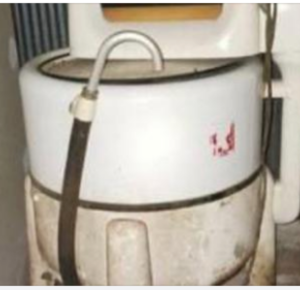When you first saw it, you probably thought, “Yes, that’s an iron.” But did you ever imagine how these irons used coal to heat up and iron clothes? Welcome to the fascinating world of the charcoal iron.
In our pursuit of a perfectly tidy appearance, we’ve come a long way. While electric irons have become the norm, offering a quick and convenient way to ensure wrinkle-free clothes, it’s always intriguing to explore the origins of lesser-known ancestors like the charcoal iron.
As the name suggests, charcoal irons relied on the power of burning charcoal to heat up and press clothes. These devices hold a unique place in the history of household inventions, serving as a testament to the resourcefulness and creativity of a bygone era.
Before the advent of modern electric irons, charcoal irons played a vital role in keeping our clothes crisp and presentable. They held a prominent place in households across the world, faithfully serving their purpose with burning charcoal and expert craftsmanship.
The Breakthroughs in Ironing Technology
Before charcoal irons came into the picture, people relied on various methods to smooth out their garments. Some even used heavy objects heated over open flames. But the invention of the charcoal iron revolutionized the ironing industry.
These cast iron irons were ingeniously designed to accommodate a receptacle for burning charcoal, providing a more consistent and effective heat source. This breakthrough ensured a more efficient ironing experience, saving time and effort.

Mechanical Intricacies of the Charcoal Iron
The creation of charcoal irons, harnessing the thermal energy from burning charcoal, was truly remarkable. The iron’s hollow shape cleverly housed the burning charcoal, emitting a continuous and regulated warmth to the steel soleplate.
To start the ironing process, users would open the chamber, insert the charcoal, and begin ironing. The wooden handle ensured that it remained cool enough to hold, even during use. The mechanics of the charcoal iron showcased the ingenuity of its creators.
Transforming Domestic Life
Incorporating charcoal irons had a transformative effect on household tasks and the quality of ironing. Let’s take a closer look at the ways in which they left an indelible mark:
Improved Efficiency:
Charcoal irons provided a consistent and reliable heat source compared to their predecessors. This resulted in shorter ironing sessions and increased efficiency, leaving more time for other essential tasks.
Optimized Pressing Results:
The steady warmth from the smoldering charcoal allowed for smoother and more consistent ironing, producing perfectly pressed clothes. Charcoal irons elevated the quality of garment care.
Global Adoption:
Charcoal irons quickly gained popularity and became a staple in homes all around the world. This marked a pivotal moment in the evolution of ironing technology, showcasing the global demand for efficient and effective irons.
Reduced Physical Strain:
Unlike previous methods that required frequent reheating, charcoal irons reduced the physical exertion associated with ironing. This innovation brought relief to those who struggled with the physical demands of keeping their clothes wrinkle-free.
The Transition to Modern Electric Irons
While charcoal irons represented a significant leap in ironing technology, they still required careful maintenance and operation. As innovation continued to propel us forward, the introduction of electric irons in the early twentieth century sparked a new revolution in the field.
Electric irons eliminated the need for charcoal, providing a simple and immediate heat source. Ironing became even more accessible and efficient, forever changing the way we approach this everyday task.
Keeping a Piece of the Past Alive
Today, charcoal irons are cherished as relics that offer a tangible connection to the past. They serve as gateways to ancient ages and remind us of the ingenuity of our forefathers. Collectors and enthusiasts value these artifacts for their practical use in historical reenactments and exhibitions, as well as for the stories they tell about Victorian home life.
The charcoal iron holds a significant place in the history of domestic tasks, representing a chapter of human ingenuity and adaptability. Its evolution from ancient approaches to more advanced technologies speaks volumes about our relentless pursuit of efficiency and progress.
While electric irons have taken over our homes, the legacy of charcoal irons lives on as a tribute to the inventiveness and perseverance of those who relied on them to keep their clothes clean and crisply pressed.





